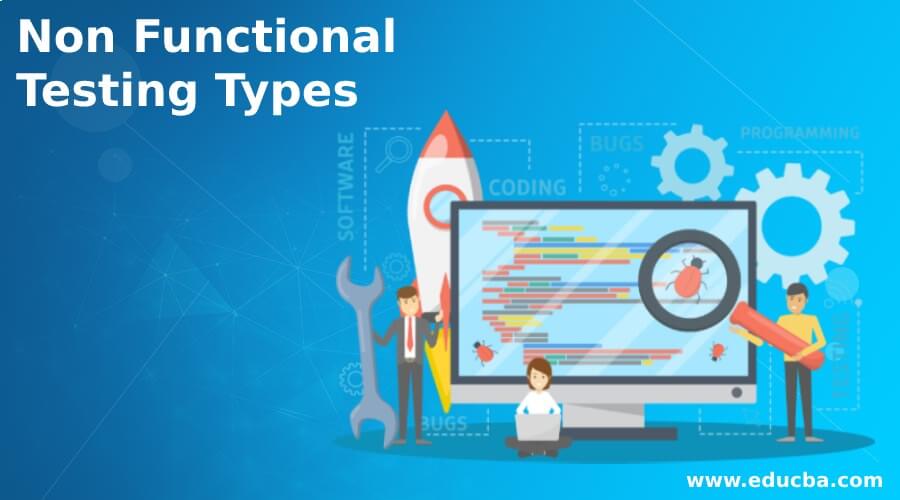Updated June 12, 2023
Introduction of Non Functional Testing Types
Non functional testing is a types of software testing that is used to test the non functional aspects of the software like loading, reliability, performance, security, recovery, volume, stress, etc. Based on these aspects, non functional testing is categorized into various types such as compliance testing, baseline testing, documentation testing, reliability testing, load testing, performance testing, recovery testing, security testing, scalability testing, stress testing, usability testing, and volume testing.
Types of Non Functional Testing
- Baseline Testing: Baseline testing is a type non functional testing that is used to validate documents and specifications on which the test cases are designed. That means it creates a base for new creation. As it test the requirements at early stage, many problems are discovered and solved at early stage. Baseline testing is also called as benchmark testing. It helps to measure the important characteristics and requirements and analyze the performance of the application.
- Compliance Testing: Compliance testing is a non functional testing technique that is used to validate whether the developed system meets the organization’s defined standards or not. It is also known as conformance testing. It evaluate the documentation of the project to check for completeness and reasonable. The standards are used by IT industry and large organizations like IEEE, W3C, etc.
- Documentation Testing: Documentation testing is used to test the documented artifacts that are usually developed before or during the software testing process. Documentation testing helps in estimating the testing effort required, tracking requirements, coverage of the test, etc. It includes the description of commonly used documented artifacts related to software development band testing like test plan, test cases, traceability matrix.
- Reliability Testing: Reliability testing is a type of non functional testing which is used to validate whether software can perform failure free operations for the specified time period in a particular environment. It is used to test the performance of the software under given conditions. It’s main objective is to find the number of failures occurring in a specific amount of time. Test retest reliability, decision consistency and parallel forms reliability are three main approaches used by reliability testing.
- Load Testing: Load testing is a type of non functional testing which is used to test the performance of the software under a specific expected load. It determines how software application behaves while being accessed by multiple users simultaneously. It’s main goal is to improve the performance and ensure stability and smooth functioning of the software before deployment. It helps to identify bottlenecks in a system under heavy user stress scenarios.
- Performance Testing: Performance by is used to test the speed, stability, scalability, reliability, response time of the software under the expected workload. It’s main goal is to identify and eliminate the bottlenecks of performance. It helps to identify your testing environment, identify the performance acceptance criteria. LoadNinja, Jmeter, HP LoadRunner are commonly used performance testing tools.
- Recovery Testing: Recovery testing is a type of non functional testing which is used to verify the ability of software to recover from failures like software or hardware crash, network failure, disk failure, etc. Its main goal is to determine whether software operations will going to performed to well after the failure of the data or software/ hardware.
- Security Testing: Security testing is used to determine the security of the software. It’s main goal is to ensure that software systems arr free from any threats that can cause the loss. It measures the potential vulnerabilities of the system and helps to detect the possibility of the security risk in the software, help developers to fix security problems through code. It involves various operations such as penetration test, security scanning, vulnerability scanning, risk assessment, security auditing.
- Scalability Testing: Scalability testing is non functional testing type that is used to measure the performance in terms of its ability to scale up or scale down the number of user requests or other such performance attributes. It measures attributes like response time, throughput, CPU usage, Memory usage, Network usage. Main goal of this testing is to determine that developed software is able to accommodate changes in internal application, hardware, software.
- Stress Testing: Stress testing verify the stability and reliability of the software. it’s main goal is to measure software on it’s robustness and error handling capabilities under heavy load conditions and ensures that software does not crash under crash stress testing is also known as endurance testing. Stress testing is categorized in distributed stress testing, application stress testing, systematic stress testing, transactional stress testing, and exploratory stress testing
- Usability Testing: Usability testing test how user friendly the system is, it measures how easy and user friendly the software is. It mainly concerns users ease of using applications, flexibility and ability to handle controls. It helps developers to satisfaction of end-user and improves the efficiency of the software.
- Volume Testing: Volume testing analyze the performance of the system by increasing the volume of the data in a database. It helps to identify the capacity of the system under heavy and low volume. By identifying load issues at an earlier stage, it can save cost.
Conclusion
Here in this article, we have discussed the various types of non functional testing. It is designed to test the readiness of system bas per non functional parameters which are never addressed by functional testing. We Hope you enjoyed the article.
Recommended Articles
This is a guide to Non Functional Testing Types. Here we also discuss the introduction and types of non functional testing along with a detailed explanation. You may also have a look at the following articles to learn more –



